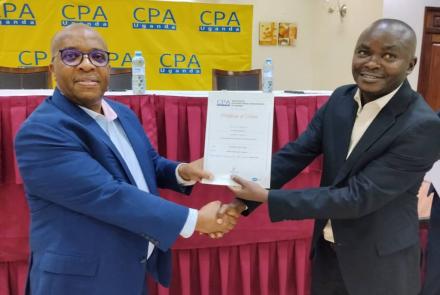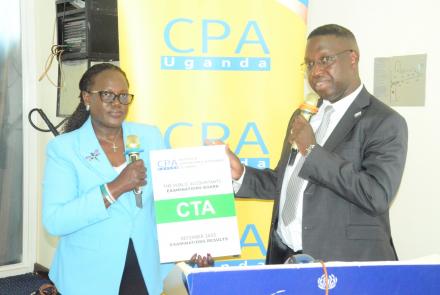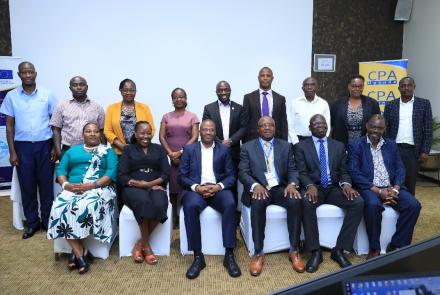By CPA Charles Lutimba,
Director of Standards and Regulations, ICPAU
The global business landscape is undergoing a profound transformation; one where financial performance alone is no longer the sole measure of success. Investors, regulators, and the public now demand transparency in how entities manage environmental, social, and governance (ESG) risks and opportunities and sustainability in general. In response, Uganda is taking decisive steps to align with international best practices by adopting the IFRS Sustainability Disclosure Standards (Sustainability Disclosure Standards). As the national regulator of the accountancy profession, the Institute of Certified Public Accountants of Uganda (ICPAU) is leading this critical transition, ensuring that sustainability reporting becomes an integral part of corporate accountability.
A Strategic Commitment to Transparency: The journey towards integrating sustainability reporting into Uganda’s corporate reporting ecosystem began in 2019 with the formation of the Uganda Integrated Reporting Committee (UIRC). Tasked with developing a roadmap for the adoption of IFRS Sustainability Disclosure Standards, the UIRC has worked meticulously to align Uganda’s regulatory framework with global standards while addressing local economic realities.
A pivotal moment came on 3rd September 2024, during the 29th ICPAU Annual Seminar, when the Council of ICPAU formally announced Uganda’s adoption of the Sustainability Disclosure Standards. This decision was not made in isolation, it reflects Uganda’s broader commitment to sustainable development, climate resilience, and economic transparency.
The validation workshop on 13th August 2025 was a crucial milestone, bringing together regulators, financial institutions, listed entities, and SMEs to refine the adoption roadmap. The goal was to ensure that the implementation is practical, scalable, and beneficial for all stakeholders.
Why This Matters for Uganda; Sustainability reporting is more than a compliance exercise, it is a strategic tool that enhances Uganda’s economic resilience and global competitiveness. Transparent sustainability disclosures build investor confidence, enabling Ugandan businesses to access local and or foreign capital markets. They also align with national priorities, such as the National Climate Change Act, Green Growth Development Strategy, and sectoral Climate Risk Guidelines, reinforcing Uganda’s commitment to a sustainable future.
The Sustainability Disclosure Standards provide a unified framework, reducing the fragmentation seen in various sustainability reporting in the past. This harmonisation ensures that disclosures are consistent, comparable, and decision-useful key factors for attracting foreign investment and fostering long-term economic stability.
The Roadmap will be a gradual but firm approach. Recognising the diverse capacities of Ugandan entities, the adoption of Sustainability Disclosure Standards will be embraced in a phased manner:
2026-2027 (Voluntary Adoption): Entities are encouraged to familiarise themselves with the standards, with 2026 serving as a rehearsal year.
From accounting period beginning on or after 1 January 2028, it will become mandatory for all
- Listed entities
- All financial institutions and micro-finance deposit-taking institutions
- An entity that carries on insurance business under an insurance contract whether as an Insurer or re-insurer
- Government Business Entities which apply the IFRS Accounting Standards; while a Retirement Benefit Scheme, Savings and Credit Cooperative Organisations (SACCOs) and a large entity as defined under the ICPAU IFRS for SME Accounting Standards Implementation Guidelines and other entities defined as PiE under the ICPAU Guidance, will mandatorily adopt the Sustainability Disclosure Standards from accounting period beginning on or after 1 January, 2029.
- The SMEs will have a mandatory reporting from accounting period beginning on or after 1 January 2030.
This structured rollout ensures that no entity is left behind, while maintaining high standards of accountability.
Assurance Requirements: A gradual approach will be taken, starting with limited assurance in 2029 and transitioning to reasonable assurance by 2031. Generally, assurance will be required after the first year of mandatory application and reporting in compliance with the Sustainability Disclosure Standards. Given the complexity and resource-intensive nature of sustainability assurance, the roadmap adopts a phased approach to assurance for sustainability information, ranging from limited assurance, to reasonable assurance and from calling for assurance on some parts of the standards to requiring full assurance on all the requirements of the standards.
Preparing for the Future: The successful implementation of IFRS Sustainability Disclosure Standards hinges on collaboration and capacity building. ICPAU, in partnership with the Pan African Federation of Accountants (PAFA), will roll out specialised training programs for accountants, auditors, and reporting entities. A key enabler will be the ESG Exchange, a digital platform offering courses, case studies, and certification programs to equip professionals with the necessary skills.
Regulatory oversight will also play a critical role. ICPAU will provide guidelines, monitoring mechanisms, and support tools to ensure compliance while recognising the unique challenges faced by smaller entities.
The adoption of IFRS Sustainability Disclosure Standards is not just a regulatory milestone, it is a defining moment for Uganda’s economic future. As we approach the official launch on 4th September 2025, businesses, professionals, and policymakers must embrace this shift with urgency and commitment.
Sustainability is no longer an optional add-on; it is the bedrock of resilient and forward-thinking enterprises. Uganda’s proactive stance positions it as a regional leader in ESG and sustainability transparency, setting a precedent for others to follow.
The time to act is now. Let us work together to make sustainability reporting a cornerstone of Uganda’s growth story.
-END-





